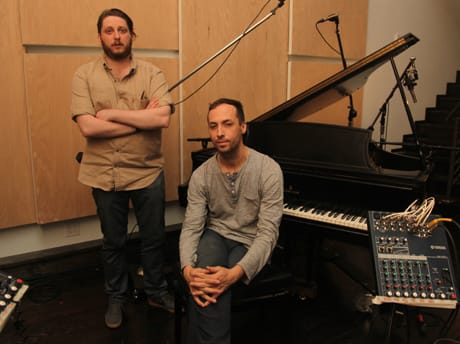To those familiar with the music of Tim Hecker and Daniel Lopatin, a collaboration between the two seems like such a logical fit, you almost wonder why it didn't happen earlier. Although their respective styles are markedly different — Hecker coming from the world of ambient and noise, and Lopatin known for his modern, glitchy take on kosmische as Oneohtrix Point Never — they nevertheless share a musical kinship in their love of drone as well as their fluid approach to structure and eagerness to embrace experimentation.
Instrumental Tourist is the first release in Lopatin's Software Studio Series, which was conceived as a way to get musicians together to collaborate in a studio setting, taking them out of their usual environs and pairing them with an unusual, or unfamiliar, partner. "What I wanted to do was get musicians that haven't collaborated together but might want to," says Lopatin, "for day-long or two-day-long sessions, to improvise and not have things plotted out or come with a demo but more or less jam, try out ideas and engage with the studio on that level, because it's kind of a rare thing these days." The venue in question was Mexican Summer studios in Brooklyn, close to Lopatin's home and heart, being the habitual studio for Software Records.
Despite the seeming seriousness of both artists, it's not unusual for some subtle humour to be buried within their abstract and often academic work, especially with their choice of playful track and album titles. On Instrumental Tourist, the pair take this playfulness even further, using a suite of often cheesy "instruments of the world" midi presets as their starting point to jam with, process and manipulate. "What we were trying to do was to deal with canned sounds that had a contentious value to them," Lopatin explains. "Contentious being that they were distillations of 'world music' instruments, tropes and ideas meant to be deployed for commercial purposes. We wanted to take those sounds, scrub away the cliché and see if they were salvageable."
Despite the playful starting point, Instrumental Tourist isn't kitschy or throwaway in any sense and, in typical form for both musicians, you can barely discern the source material, a few choral flourishes and some new age koto sounds aside. Lopatin is also quick to point out that it's not necessary to get behind the concept to appreciate the album. "The end result is divorced from any idea or concept. I think it just sounds like us musically. You don't necessarily need that to enjoy the record."
Instrumental Tourist is the first release in Lopatin's Software Studio Series, which was conceived as a way to get musicians together to collaborate in a studio setting, taking them out of their usual environs and pairing them with an unusual, or unfamiliar, partner. "What I wanted to do was get musicians that haven't collaborated together but might want to," says Lopatin, "for day-long or two-day-long sessions, to improvise and not have things plotted out or come with a demo but more or less jam, try out ideas and engage with the studio on that level, because it's kind of a rare thing these days." The venue in question was Mexican Summer studios in Brooklyn, close to Lopatin's home and heart, being the habitual studio for Software Records.
Despite the seeming seriousness of both artists, it's not unusual for some subtle humour to be buried within their abstract and often academic work, especially with their choice of playful track and album titles. On Instrumental Tourist, the pair take this playfulness even further, using a suite of often cheesy "instruments of the world" midi presets as their starting point to jam with, process and manipulate. "What we were trying to do was to deal with canned sounds that had a contentious value to them," Lopatin explains. "Contentious being that they were distillations of 'world music' instruments, tropes and ideas meant to be deployed for commercial purposes. We wanted to take those sounds, scrub away the cliché and see if they were salvageable."
Despite the playful starting point, Instrumental Tourist isn't kitschy or throwaway in any sense and, in typical form for both musicians, you can barely discern the source material, a few choral flourishes and some new age koto sounds aside. Lopatin is also quick to point out that it's not necessary to get behind the concept to appreciate the album. "The end result is divorced from any idea or concept. I think it just sounds like us musically. You don't necessarily need that to enjoy the record."
